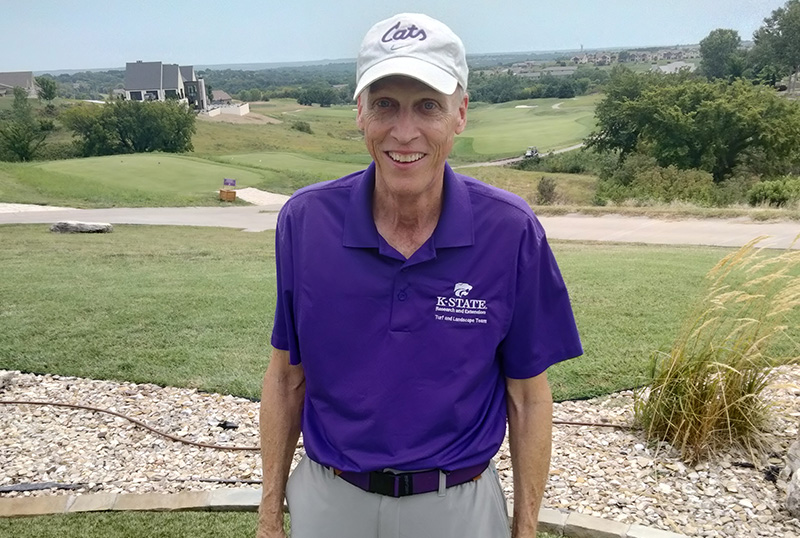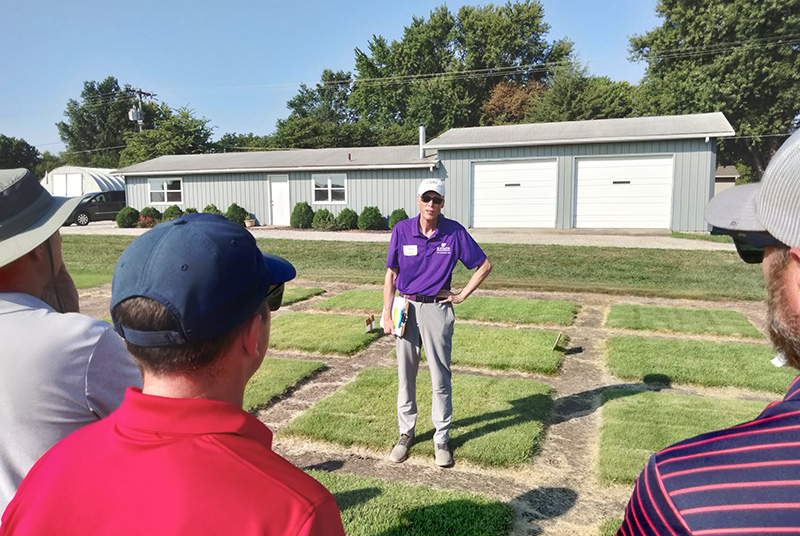
Jack Fry, the head of K-State’s turfgrass program in the Department of Horticulture and Natural Resources, will officially retire Aug. 15 after a storied career in the industry. Photos by Howard Richman
Even after he retires this week, Kansas State University’s Jack Fry, Ph.D., isn’t exactly done.
“I have a new bermudagrass cultivar (along with breeder Yangqi Wu, Ph.D., at Oklahoma State University) coming out in the near future,” Fry says.
This says so much about Fry’s past — and what he achieved during it made this industry a better place then, now and the future. The Kansas City area native’s career began as a student in 1978 at K-State, enrolling in a turfgrass management class, and guided by adviser Bob Carrow, Ph.D. That auspicious start eventually led to Fry becoming the head of K-State’s turfgrass program in the Department of Horticulture and Natural Resources.
Now, nearly 50 years later, Fry officially retires Aug. 15. Last week, Aug. 7, he participated in the Kansas Turf & Ornamentals Field Day at the Rocky Ford Turfgrass Center in Manhattan — a place that’s had Fry’s fingerprints all over it for 27 years. That event was followed by a retirement celebration at Colbert Hills golf course.
It seemed an appropriate spot to honor the 28-year GCSAA member. After all, he spent 34 years working at K-State. That span followed his start as an educator in 1982 as a graduate assistant at the University of Maryland, and then at Colorado State University, where he earned his doctorate. Fry moved to Louisiana State University in 1987 as an assistant professor and stayed there until K-State brought him home in 1991.
From 2013 to 2022, Fry wrote a column for GCM titled “What’s the big Idea?” Throughout the years, he also wrote articles for the magazine. He’s a 28-year GCSAA member.

Fry participates in the Kansas Turf & Ornamentals Field Day in Manhattan (Kan.) as an educator one last time.
Fry has served in recent years as professor and commercial turfgrass Extension specialist for K-State. Between all those decades of accolades, he advised numerous undergraduates and more than 20 graduate students (including 12 who earned Ph.D. status). In 2022, he was chosen recipient of the inaugural Outstanding Contribution Award by GCSAA.
Fry focused much of his attention on research, with his work featured in over 130 refereed publications. In 2004, with Bingru Huang, Ph.D. at Rutgers University, Fry co-authored the book “Applied Turfgrass Science and Physiology.” He has been part of three Zoysia cultivars, not to mention that upcoming cultivar he has in the works with Wu.
Once upon a time, Fry considered becoming an assistant superintendent. Ultimately, he chose to stay in academia. Those who attended his retirement celebration reeled off reasons why it turned out to be the right decision. They touted his industry influence locally, nationwide and internationally. The impact he had on students was immense, as well as youths through his support of GCSAA’s First Green program.
As for what’s next, Fry and his wife Nathalie found a home in Florida, where they will reside. He still will have golf on his mind. “I may be involved with a golf course nearby. … employment or volunteering,” he says, adding that return trips to the KC area to see their children and grandchildren are a given.
No doubt he will continue to cheer for K-State athletics — and root on the turfgrass program and those he’s leaving behind at the school that he made such a mark on in Manhattan. “The great relationships among all of them made this a very positive place to serve the turf industry,” Fry says.
Howard Richman is GCM’s associate editor.